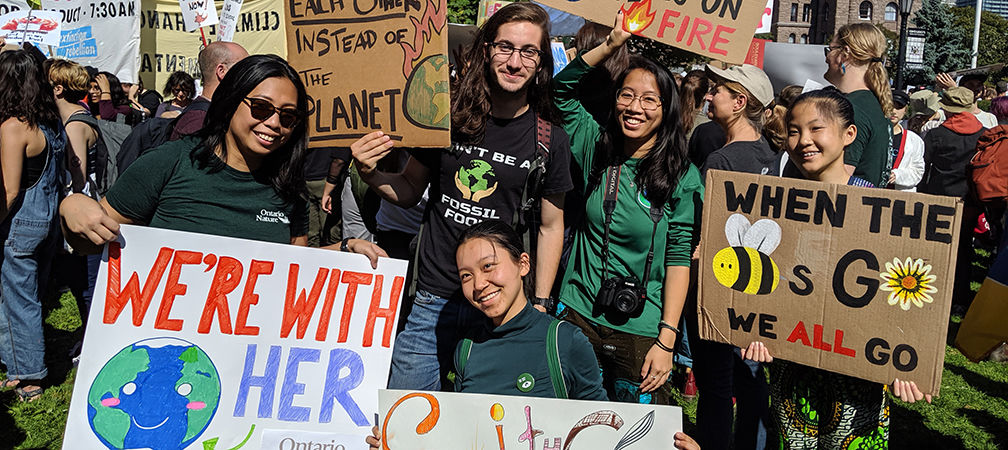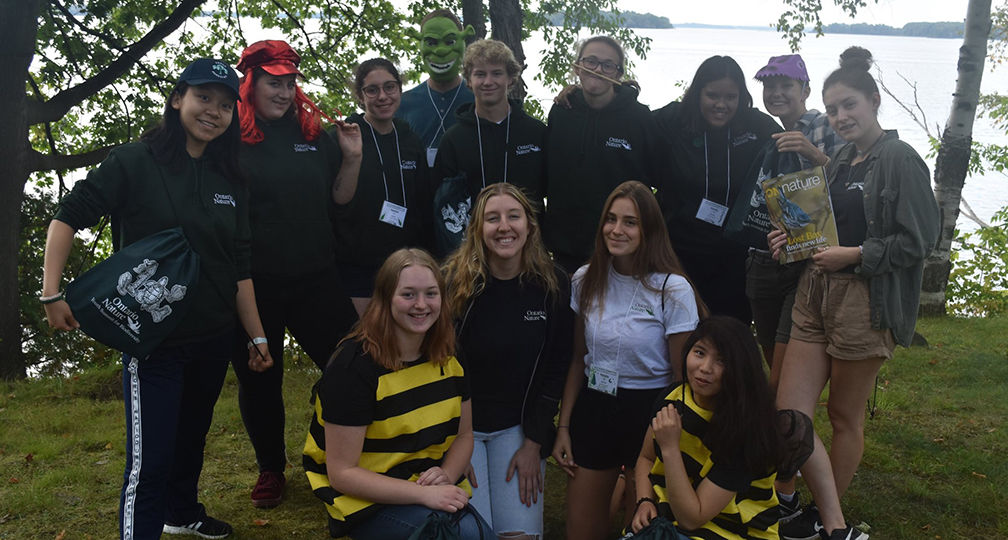Ontario Nature Blog
Receive email alerts about breaking conservation
and environmental news.
© Lora Denis
Ontario Nature Youth Summit, 2019 © Ryan Wolfe
Caring about the Earth is hard. There are some very rewarding and fulfilling experiences, but there is also serious despair. It seems that every time we check the news there’s another setback. Emissions increasing, biodiversity loss, Indigenous rights violations, ignorant political leaders – stories almost designed to make our battle to save the planet seem impossible. So how do we bring ourselves, day-after-day, to navigate the constant storm of obstacles – the news, the resistance, the ‘haters’ – that we encounter working in the environmental movement?
I’ve been organizing events related to climate justice and sustainability with the Ontario Nature Youth Council and beyond for six years now. At the beginning, I just knew I cared and wanted to do something. The more I learned about the overwhelming crisis we face the more anxiety and guilt I felt. Was I doing enough? And somewhere along the way, I told myself: how could I be having fun, going to parties, or – dare I say it – being “unproductive”, when there is so much work to be done? How could I ever invest in a genuine relationship? How could I do anything but fully devote my time and energy to an issue that is so much bigger than me? For a long time, I convinced myself that my sole purpose was to do everything in my ability to make an impact for the environment – and it worked. I had never been more involved or more productive in my life – but then came the crash.

This year, a big youth conference I was organizing for the University of Guelph Sustainability Office faced some seriously exhausting challenges: a partner group backed out, we lost a grant, schools were striking… And I noticed something surprising in myself – I almost wanted the event to be cancelled. I was cynical and felt like any energy I put into the conference wouldn’t lead to a meaningful output. When it was inevitably cancelled due to COVID-19, I wasn’t upset, or disappointed, or even frustrated – instead, I felt indifferent. In short, I was burned out.
After years of devoting myself to environmental activism, I just felt like giving up. The joy, the fulfillment that I received from organizing was gone – replaced by a feeling of obligation. It scared me. The spark that drove me to act was gone. And the stories about our planetary crisis kept on coming, whether or not I had the energy to keep up the fight. It was overwhelming.
Burnout was something I hadn’t properly experienced before, but it’s something that all dedicated activists encounter in some form or another if they stick around long enough.
While I certainly am not an expert – and by that, I mean I am not an expert – here are a few valuable things I’ve learned about handling burnout and sustaining yourself in the long-term.

You don’t need to handle the tough emotions, stress and anxiety that arise on your own. Sharing with other people who also care, and who are willing to listen, is important. For me, that involved many (many) evenings spent with people dear to me, opening up as I processed the stress I was feeling – and learning that more often than I thought, others felt the same way. The community around us can be an incredible source of inspiration and emotional security – building a strong and authentic support network with others is invaluable.
There are millions of people around the world working to solve climate change, biodiversity loss, and any other issue you’re likely passionate about. Yes, each one of us can have a huge impact on our communities, but no single individual can save the planet. The problems we face are just too big. It’s important to set goals, but the immense pressure we put on ourselves to have a bigger and bigger impact is unsustainable in the long term. Accept what you cannot control and focus on what you can.
Taking on too many commitments is emotionally draining and prevents you from creating the space you need to fully and passionately act on something you care about. Even if it feels like you should be taking on more, stretching yourself beyond your means is a surefire way to crash and burn. You’re most valuable to the environmental movement if your contributions are long term and sustainable, so start small and start with yourself. Listening to your own needs and knowing when to take a step back is the key to avoiding the suffering that can come with dedicated activism.
For me, hyper-focusing on the cause I was devoted to meant failing to recognize some of the most incredible people and greatest joys in my life. Finding ways to destress beyond activism is an important way to recover from burnout and reconnect with your key values. Start working out. Journaling. Drawing. Reconnect with friends. Take up mindfulness. My passion for what I do comes from a love of wilderness camping – so I’ve recently set a goal of rediscovering this interest. After all, it’s the places and people we love that make environmental activism so important in the first place, and what give us the drive to keep going: day after day, and even year after year.
Healthy outlets and community can bring us closer to our core values and rekindle the passion that is lost when we are burned out. Civil rights activist Audre Lorde said, “Caring for myself is not self-indulgence, it is self-preservation. And that is an act of political warfare.”
A burned-out activist is of no good use to anyone, so gently do what you can to keep yourself healthy and manage stress – the rest will follow. Being a guardian for nature isn’t easy, but we’re all in this one together, and we’re in it for the long haul.

Gananoque Lake Nature Reserve © Smera Sukumar
Aidan, this was something I really needed to hear. Thank you for sharing your experience and insight.
Adrian, I truly appreciated your very frank and insightful blog. It reminded me that I must care for my own mental health while also advocating for protection and enhacement of biodiversity. Stay strong, and keep up your good work on behalf of nature.